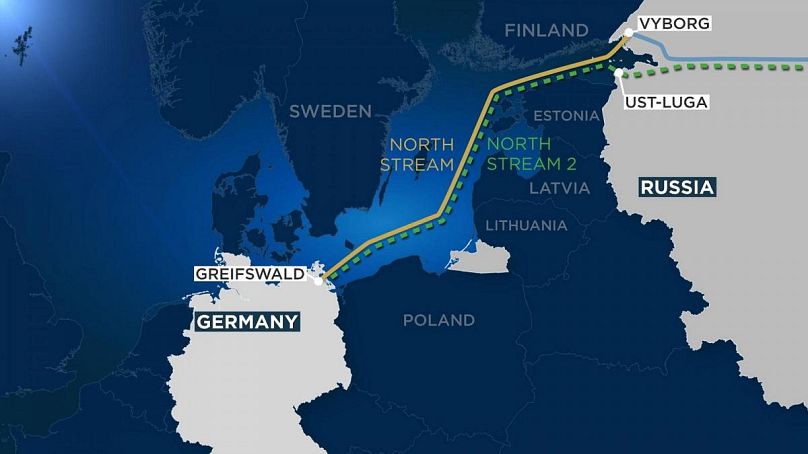The US Secretary of State said the controversial project "undermines basic EU principles" and poses a challenge to Ukraine and Poland.
A nearly finished gas pipeline between Russia and Germany is a bad idea and a bad deal for Europe, US Secretary of State Antony Blinken has told Euronews.
 ADVERTISEMENT
ADVERTISEMENT
 ADVERTISEMENT
ADVERTISEMENT
Nord Stream 2 is 95% complete but critics say it provides a dangerous tool for Vladimir Putin to exert influence over the continent.
"What's important first and foremost is that Germany is one of our closest allies and partners anywhere in the world," Blinken said in an interview with Euronews at the end of his four-day visit to Brussels.
"And the fact that we have a disagreement over Nord Stream 2 - and it's a real one - is not affecting and will not affect the overall partnership and relationship.
"But we've been very clear. President Biden has been very clear that he thinks that Nord Stream 2 is a bad idea and a bad deal for Europe, for us, for the alliance.
"It undermines basic EU principles in terms of energy security and energy independence. It poses a challenge to Ukraine, to Poland, to other countries that we care about."
Last year, the US Congress passed a law to sanction private companies involved in the construction of the project. Blinken has already warned his German counterpart Heiko Maas that sanctions are a real possibility.
Speaking more broadly, Blinken said there were a number of concerns around Russia, including the development of new weapons systems, cyber-attacks, interference in elections, placing bounties on US troops stationed in Afghanistan and continuing its aggression in eastern Ukraine. Blinken also chided Russia for allegedly poisoning and jailing opposition leader Alexei Navalny.
"I think we also recognise that there may be areas where out of mutual interest, we can still work together," he conceded, citing matters of "strategic stability" like arms control.
"But that is not going to stop us from standing up strongly in a united way with our allies and partners when Russia commits aggressive acts."
Blinken on... China sanctions
Blinken commended the European Union for joining the US, the UK and Canada this week on a coordinated raft of sanctions against Chinese officials believed to be involved in the human rights sanctions against the Uyghur minority in Xinjiang. The move represents the first time the bloc sanctions China in more than thirty years.
"This is not about ganging up on China," Blinken added. "It's not about trying to hold China down or to contain it. It is about standing up together for the interests and values that we share.
"We found that the best way to make sure that countries can work together and manage their relations productively is to sign up to a common set of rules and commitments. And our challenge is to make sure that we uphold that order.
"And so when any country, whether it's China or anyone else, [is] not playing by the rules, we have an obligation to stand up. And we're much more effective in doing that when we're doing it together in solidarity."
Blinken on... the US' differences with Turkey
Blinken reaffirmed America's commitment to the NATO alliance and to the partnership with the European Union.
But on NATO, he admitted that important differences still remain among allies, particularly when it comes to Turkey buying weapons from Russia.
"It's no secret that we have a real difference with Turkey on that [buying weapons from Russia]. It's also true that Turkey is a longstanding and very valuable ally that works together with us on very important objectives, including counter-terrorism [and] dealing with Syria," he said.
"I think we have an interest in continuing to work closely with Turkey without at the same time ignoring our differences."
Asked about the tensions in the eastern Mediterranean, which last summer triggered an all-out crisis between Turkey and Greece, Blinken praised the role played by NATO in the resolution of the conflict.
"I think NATO's playing a very good role in trying to de-conflict and make sure that the areas where they're where their disputes, no one is taking provocative actions, starting with Turkey keeping their ships out of waters [in] areas that are that are claimed by others. And we need to simply see the peaceful resolution of these differences according to international law."
Blinken on... vaccine donations
On a final note reflecting on the coronavirus pandemic, Blinken said the US will act as an international leader in the health crisis, as demonstrated by the recent 2-billion dollar donation made to COVAX, the WHO-led vaccine programme for low- and middle-income countries.
The Secretary also promised the US will make more of its homemade doses available to third countries.
"We've made some vaccines available to our close neighbours, Mexico and Canada, and I anticipate that in the weeks ahead you'll see more of that."











